Simplifying Life Insurance in India
12 Developmental Milestones of a 15 Month Old Baby
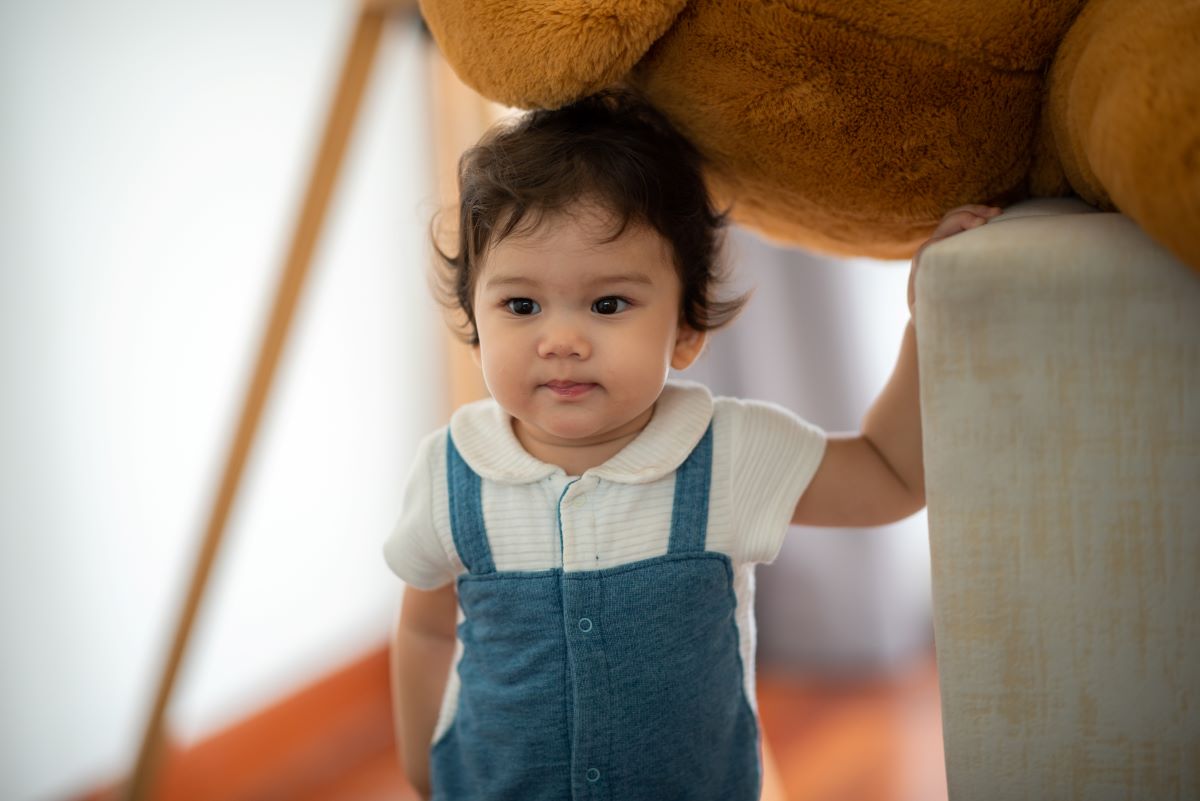
Counting the months of a baby's growth and monitoring their growth patterns is necessary. This is a vulnerable stage in a baby's development, and parents are anxious about their baby reaching milestones. All babies develop at their own pace. Allow your child to do the same.
The milestones for a fifteen-month-old include many things. Read this article to understand the typical 15 month old developmental milestones and discern when to talk to the paediatrician about your child's growth cycle.

Table of Contents

What Most Babies Do by 15 Months?
Most babies are fully developed by 15 months, so they exhibit a variety of physical, language, and social skills. Most children can walk, and at this age, they tend to start exploring their surroundings by climbing on furniture or navigating stairs. They cognitively become problem solvers by figuring out how to get the unreachable toys.
Their linguistic skills also start to be appreciated in almost 15 months as they begin uttering a few simple words and can follow simple instructions. At this stage, they discover their world and gain an understanding of it.
15 Month Milestones & Development Checklist
1. Movement Milestones For a 15 Month Old Baby

Movement Milestones for a 15 month old:
- Walking Alone: At this age, most toddlers can walk unassisted and even begin to try some forms of walking, such as walking backwards or on their toes.
- Climbing: Your child would try to climb up the furniture or the staircase and from the equipment in a playground and will insist on climbing on things.
- Squatting and Standing: Many 15-month-old babies can squat to collect toys but then return to standing, which enhances balance and muscle coordination.
- Kicking a Ball: They kick a ball forward and backward in play, demonstrating their strength and balance.
- Dancing and Rhythmic Movements: Your child may express interest in dancing or moving to the rhythm; it helps develop gross motor skills and physical expression.
2. Visual and Hearing Milestones For a 15 Month Old Baby

Visual Milestones:
The visual development of a 15-month-old is an essential aspect of their growth process. Here are the critical visual milestones:
- Depth Perception: The children will have improved depth perception, allowing them to navigate their environment quickly and judge distances more accurately.
- Colour Recognition: All 15-month-olds will recognise and name standard colours; this child would probably continue to protest against playing with a favourite colour.
- Object Tracking: During this period, your child should follow moving objects by tracking the movement with their eyes, increasing their ability to track with the eyes.
- Interest in Pictures: At this age, children show interest in pictures in books and then point them out and name objects, which is essential for their visual and mental skills.
- Hand-Eye Coordination: They develop better hand-eye coordination and can reach for things and pick them up by pointing at them correctly.
Hearing Milestones:
By 15 months of age, they approach vital stages of development that have progressed the sense of sound.
- Response to Sounds: At this age, children begin to respond more by turning their heads or just looking in the direction where familiar sounds are coming from.
- Following Simple Instructions: Children can learn to understand and follow simple verbal instructions. They can process auditory information and language.
- Identifying Names: Children start to notice names, such as their own and those of people familiar to them, symbolising the development of the child's recognition.
- Love for Music and Rhymes: It is not uncommon for children to develop an interest in music, songs, nursery rhymes, and movements or expressions.
3. Smell and Touch Milestones For a 15 Month Old Baby

Smell Milestones:
By 15 months old, your baby's sense of smell develops. The baby begins to react to different odours in his environment.
- Enhanced Sensitivity: During this age, a child becomes highly sensitive to the presence of several odours and tends to be attracted to smells when having a meal.
- Identification of Known Smells: Your child will probably identify some known smells, such as those from his caregivers' perfume or certain kinds of food.
- Exploration of Objects Through the Sense of Smell: Infants can explore objects by placing them in their noses to study their smells, thus proving their curiosity.
- New Smell Relations: Children often prefer or dislike new smells; this is normal at that stage of life, as children always learn about their surroundings.
Sniff to Remember: Your baby will begin connecting smells with activities or people, which helps them remember and feel emotions about those things.
Touch Milestones:
By 15 months, your baby's sense of touch will propel through all this discovery and learning as she becomes increasingly sensitive to different textures and sensations.
- Increased Texture Explorations: At 15 months, the children like to explore textures, such as soft, rough, or squishy items, increasing their awareness.
- Enhancement of Grasping Skills: Their capacity for picking up and manipulating objects should be enhanced, allowing them to pick up even tiny items.
- Fine Motor Skills: Students may poke, pinch, or squeeze something with their fingers to develop fine motor skills and hand-to-eye coordination.
- Investigations of Objects by Hands: Most babies use the sense of touch and feel to explore their surroundings. They are curious about how many things feel.
- Affective Responses to Contact: Your child begins showing preference for some of the texturing, such as soft, plush blankets, toys, or stuffed animals.
4. Sleep Milestones For a 15 Month Old Baby

Sleep Milestones for a 15 month old:
- Regularised Sleep Pattern: By this age, most children have started to have a relatively regular sleep pattern, with 11 to 14 hours in a 24-hour cycle, including naps.
- Transition to One Nap: To help consolidate sleep, they will transition from two naps into one long nap during the day, typically towards the early afternoon.
- Longer Night Time Sleeps: At this age, most 15-month-olds begin to sleep longer stretches, often for 10 to 12 hours uninterrupted, aiding their overall development.
- Self-Caressing Skills: Children can self-soothe more effectively, perhaps with their favourite blanket, stuffed animal, or toy that helps them sleep.
- Sleep Cues Recognition: The child should realise the sleep cues, perhaps by rubbing their eyes or becoming irritable.
5. Health Milestones For a 15 Month Old Baby
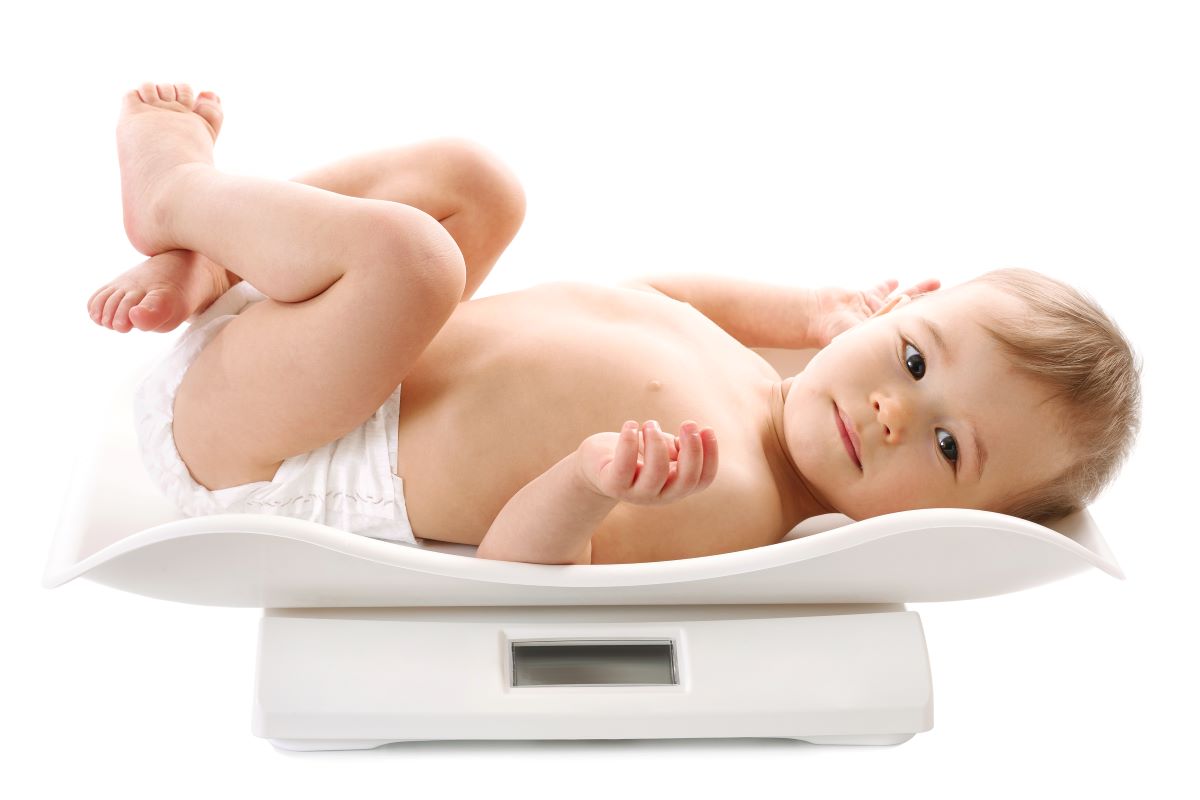
Here’s a chart summarising the ideal health milestones for a 15 month old baby:
Regular check-ups with a paediatrician can provide further insights into your child's growth patterns.
6. Feeding Milestones for a 15 Month Old Baby
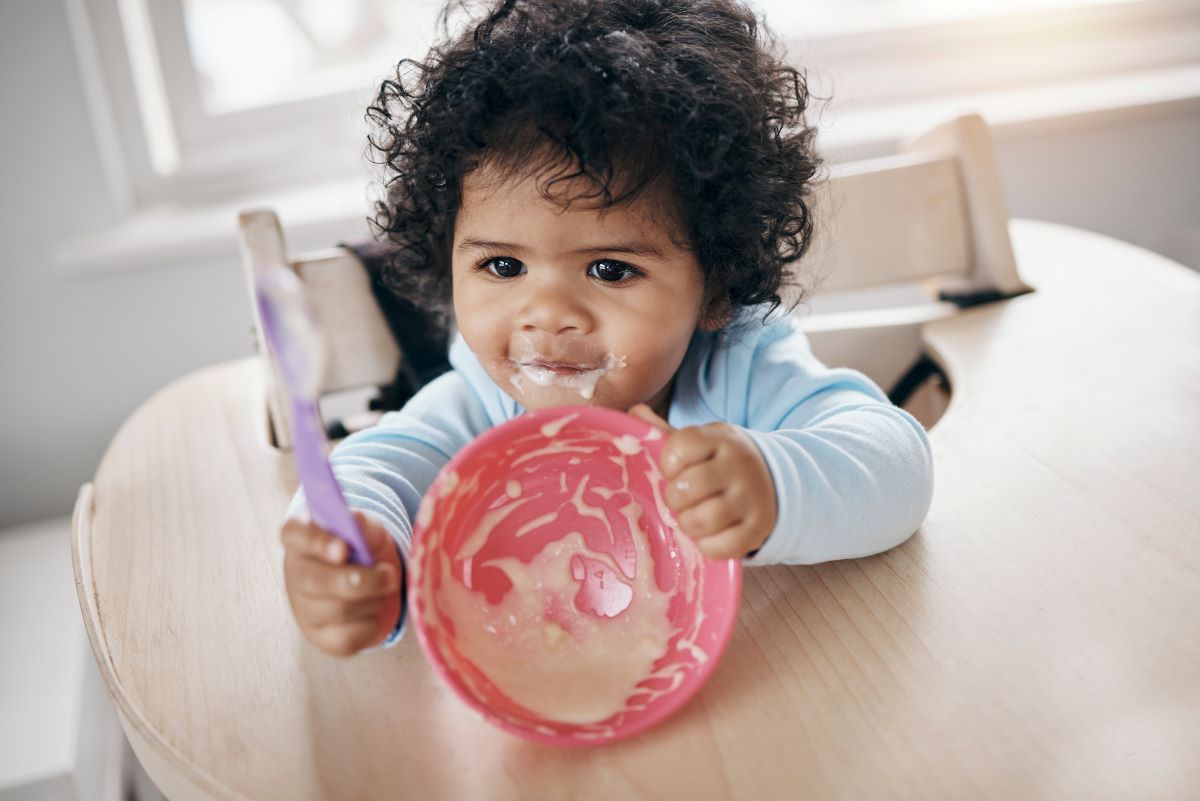
Feeding Milestones for a 15 month old:
- Self-Feeding: This is when most children can feed themselves with their hands and start to use a spoon, which indicates some motor gains and independence.
- Mixed Diet: Around this age, the child should accept different foods, like fruits, vegetables, grains, and proteins, to help develop a good eating pattern.
- Chewing Ability: At this age, most children develop the necessary chewing ability for more textured foods, such as soft meat and prepared vegetables.
- Sippin' from a Cup: Most can, with support, sip from a sippy or regular cup, enhancing their coordination and independence during meals.
- Learning About Choices: Children generally enjoy food choices. Your child should begin to tell you what they like and dislike, indicating increased familiarity with taste.
7. Schedule and Routine Milestones For a 15 Month Old Baby
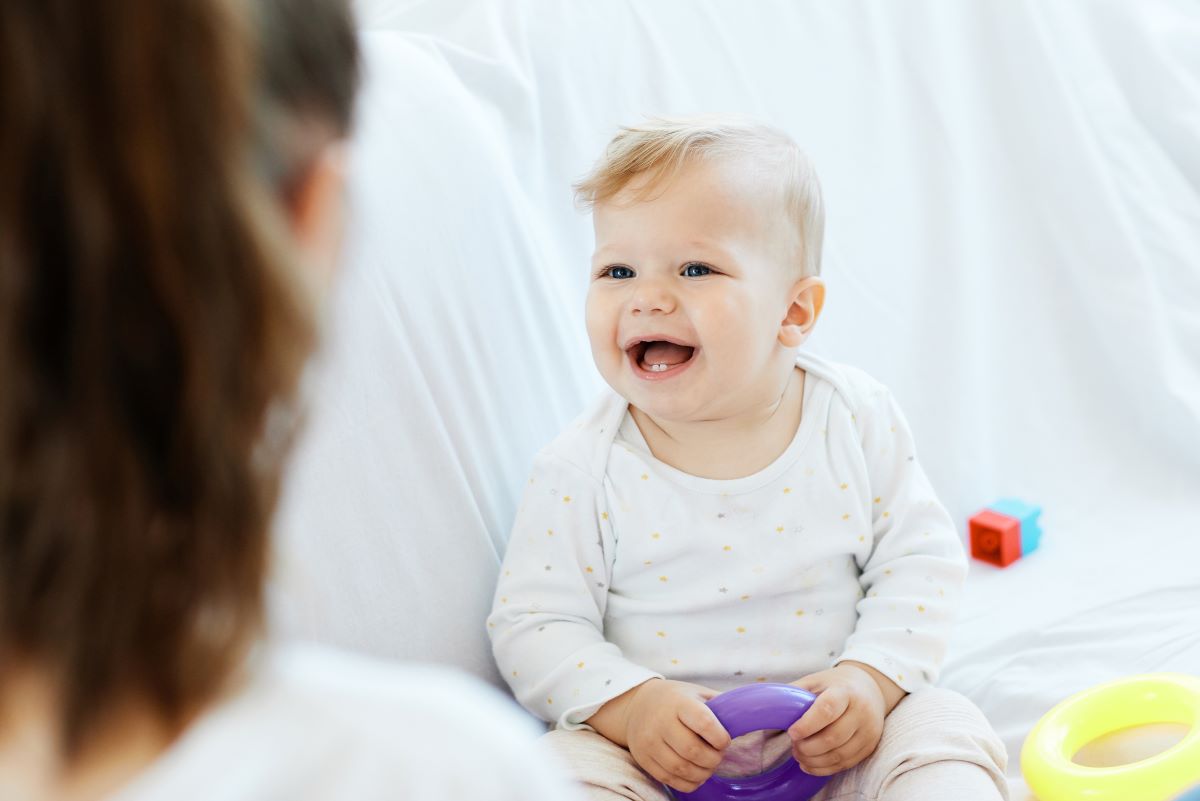
Here’s a daily schedule for a 15 month old baby:
8. Cognitive Milestones For a 15 Month Old Baby
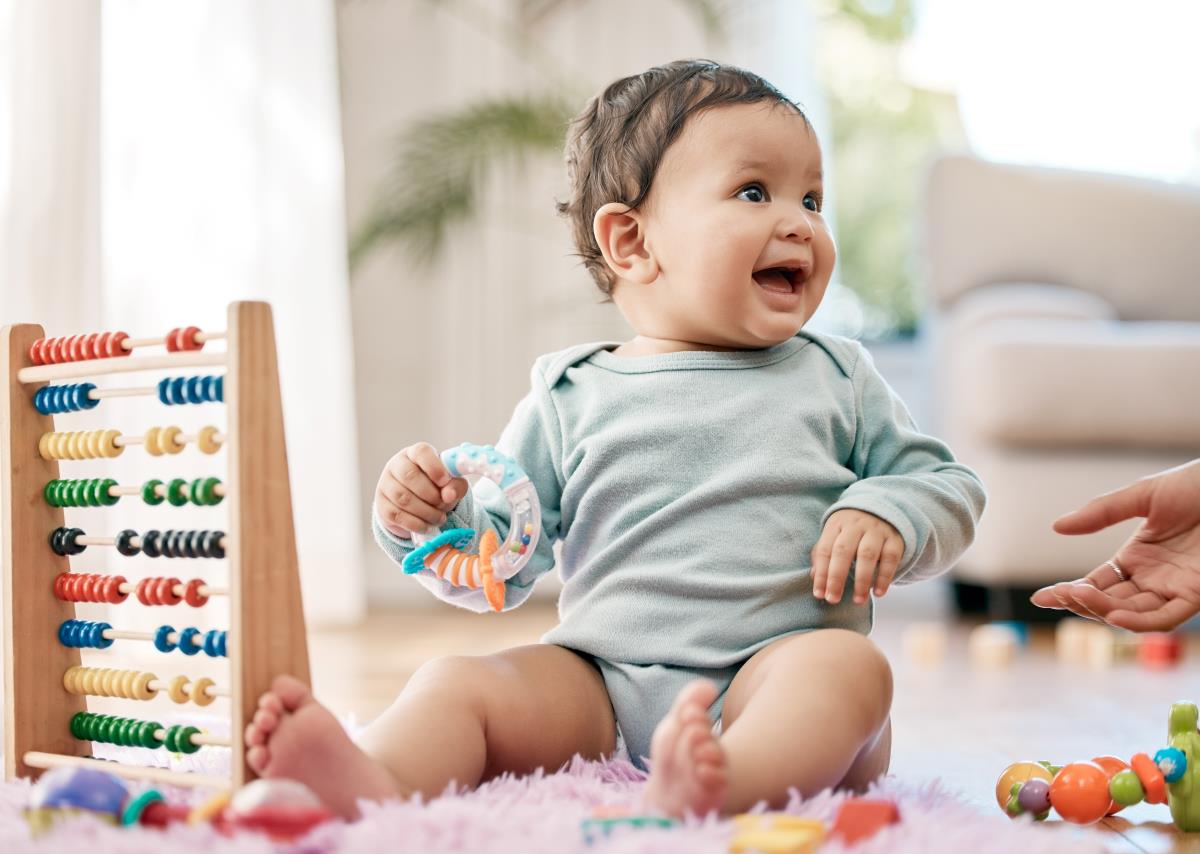
Here are key cognitive milestones for a 15 month old:
- Problem Solving: At 15 months, they start showing simple problem-solving skills, like figuring out how to get a toy that was put out of reach.
- Cause and Effect: The child starts to understand cause-and-effect relationships, like discovering that pressing the button on his toy produces sound or movement.
- Object Permanence: Most 15 month olds understand object permanence, meaning they know objects continue to exist even though they can no longer be seen.
- Straightforward Instruction: Many children can follow instructions, such as "Bring me the ball," meaning their understanding is more effortless.
- Playing with Toys: Your child may be playing more with toys that require manipulation, such as a shape sorter or a stacking toy.
9. Social and Emotional Milestones For a 15 Month Old Baby

Here are key social and emotional milestones for a 15 month old:
- Shows Affection and Emotion: Babies may begin to display greater affection. Kids use more varied facial expressions or alternative actions, such as clapping when they're happy, to communicate their emotions to you.
- Temper Tantrums: Despite sometimes surprising parents, babies use temper tantrums to express their emotions, including anger.
- Separation Anxiety: Your child can exhibit more symptoms of separation anxiety when they are not in your presence. Some babies at this age exhibit a strong preference for a carer.
- Copying Actions: At this age, toddlers imitate the actions of others. When they play together, you can witness them imitating other kids. After seeing you use them, they try to use things around the house in the "correct" manner.
10. Language and Speech Milestones For a 15 Month Old Baby

Language and Speech Milestones Development for a 15 month old:
- Verbal and Language Skills: Most 15-month-old newborns can say a few simple words, such as names of their carers ("mama" or "dada") or "no," "ball," or "doggy."
- Recognising Instructions: In addition to developing their verbal abilities, 15-month-olds are discovering alternative forms of communication.
- Pointing and Gesturing: Toddlers can also point to objects to express their wants. For example, they can point at a toy or a dog they want to pet.
11. Play Milestones For a 15 Month Old Baby

Play Milestones for a 15 month old:
- Imitative Play: The child constantly imitates what grown-ups or elder kids do, playing with kits or kitchen sets, thus improving their social skills and creativity.
- Explores the Environment: At this stage, children love exploring their environment by trying various objects, textures, and sounds.
- Simple Problem Solving: The child will solve simple problems of play. For example, they can figure out how to stack blocks or which shape goes in the sorter.
- Parallel Play: They will play with other children but don't usually play with them. They learn social norms and observe what happens in the play as other children do.
- Symbolic Play: The child starts using an object to represent another thing, such as using a block as a telephone, which helps them develop their imagination.
- Physical Play: Gross motor activities and coordination become firmer as children turn to running, climbing, and jumping.
12. Physical Development Milestones For a 15 Month Old Baby

Physical Milestones for a 15 month old:
- Walking Without Support: Most 15-month-olds now walk alone without support and show much improvement in balancing and coordinating.
- Climbing: At this age, most children like climbing up on furniture or playground equipment, and they show strength and agility.
- Fine Motor Skills: By this age, the thumb and index finger can pick up small things with a pincer grip to feed themselves.
- Throwing and Kicking: Many 15-month-olds can throw underhand and might have begun to kick a ball forward. This is a part of developing control and strength.
- Dance and Movement: Infants often start exhibiting some rhythm by dancing to music, moving their bodies around, and playing, which promotes gross motor skills.
- Self-Feeding: Children can often feed themselves using finger foods, even a spoon. This encourages hand-eye coordination.
- Pulling Up and Standing Up: Most children can pull themselves up to a stand and cruise along furniture. Their legs will be solid, and they will have good balance.
- Walking on Different Surfaces: They walk on grass, sand, or carpet, helping them learn how to adjust their balance and move in various ways.
What are the Developmental Activities For a 15 Month Old?
1. Stacking Blocks
Provide soft and colourful blocks for your child to stack and knockdown. This activity should boost fine motor skills and hand-eye coordination while spurring creativity as your child builds.2. Imaginative Play
Offer dolls, stuffed animals, or toy kitchens as a source of imaginative play while allowing a child to enact daily activities. This will enhance social skills and creativity while developing empathy and understanding of roles.3. Sensory Games
Fill a shallow container with non-hazardous material, such as rice, pasta, or water beads. Let your child engage their senses through different textures and practice scooping and pouring, which sharpens fine motor skills.4. Music Play
Introduce simple musical instruments like shakers or tambourines. Encourage dancing and clapping to the rhythm, fostering a love for music and movement while enhancing their auditory skills.5. Reading Time
Spend time reading colourful board books together. Engage your child, point to pictures, and ask them to answer in your own words about the story, which involves building vocabulary and comprehension skills.6. Art Discovery
Let them use non-washable crayons or finger paints to draw or paint almost anything they know. Train them on experimentation with colours and shapes on paper or a giant canvas for authentic self-expression and creative artistry development.7. Outdoor Exploration
Take a walk in the park with your child and let them discover nature. Encourage their curiosity about it and encourage them to find leaves or stones. Urge them to be more curious about it and further develop the act of observation.8. Tactile Puzzles
Large, chunky puzzles with simple shapes encourage problem-solving and hand-eye coordination as children learn to fit pieces together and build confidence as they finally put the pieces together.9. Water Play
Fill a shallow basin with water and provide cups and spoons for pouring. Supervised water play provides opportunities to heighten sensory experiences and fine motor skills while providing a refreshing means of developing cause and effect.10. Sorting Games
Plastic containers or household toys can be used to create sorting games by colour, size, or shape. The sense of classification develops cognitive ability and teaches early mathematical concepts and skills.11. Nature Walks
Take a short nature walk around your house with the child. You may bring back items like pine cones or flowers. This encourages curiosity and sensory exploration, whereas discussing what they see impacts language skills.12. Simple Obstacle Course
Arrange a simple obstacle course using the house's pillows, toys, and furniture. Your child will be excited to climb, crawl, or try to pass through this obstacle, stimulating physical development and enhancing their gross motor skills.Safety Tips For a 15 Month Old Baby
With time, your child learns to move about in the house. At this age, they look energetic and become curious about their world. Here are a few safety tips to follow:
Savings & Protection Options for Your Child
How to Support a Baby's Development at 15 Months?
1. Movement Exploration
Provide an environment for your child to explore and practice walking. Use push toys and engage in activities that encourage climbing and balance. These will strengthen your child's muscles and coordination.2. Linguistic Education
Speak with your child day and night. Read books and sing songs with them. Repetition implants new words and meanings in their vocabulary, thus cementing a base for clear expression and language skills.3. Social Engagement
Plan a visit to the park or an outing with a playdate. Play peek-a-boo with another child. Simple games improve social skills and bonding as your child learns critical social cues. Encourage friendship at a young age.4. Play Diversity
Locks, dolls, shape sorters, and other things allow imaginative play. This helps develop the child's motor skills and helps them learn to create and independently represent their personality and identify objects.5. Emotional Support
Validate the child's feelings and console them whenever they feel frustrated. This will encourage your child to express their emotions, ask for names, and get attached to the feelings of love and comfort.6. Establish Routine
A routine, consistent daily schedule affords security and predictability for children, which are critical factors in emotional development. Routine helps you and your child develop a smoother, more predictable rhythm in life.7. Introduce Autonomy
Encourage independence by allowing your child to explore new activities, such as feeding themselves or getting dressed. This will enable them to develop their confidence in autonomy and gradually start to accept new responsibilities.8. Interactions Over Screens
Engage them in playing together rather than sitting on the screens since your child learns this way of life. True interactions matter, particularly at this age; they are a must for development. You will interact more directly with your child, nurturing and learning together.9. Self Feeding
Introduce healthy foods and let them learn self-feeding. This will support their physical development and help them instil good habits regarding healthy eating, which is integral to their growth.10. Play Actively
Spend time outdoors or find physical activities that allow your child to run, jump, and explore, providing for their physical and motor skills. Active play is not only enjoyable but also essential for their physical well-being.When to Talk to the Paediatrician?
Delayed Milestones:
When the child has failed to meet the expected developmental milestones, such as walking or speaking at the scheduled time.Language Concerns:
When your child has never said any words by 15 months or has a limited vocabulary, monitor them by visiting the paediatrician.Sleep Disorders:
If your child does not fall asleep at night and wakes up, preferably at night, for more than one week.Concerning Symptoms:
If a child has had a fever for over two days, has a rash, or has a continuing cough.General Concern Over Development or Health:
If you have general concerns about your child's development or health.Family History:
If you have a family history of developmental disorders, discussing it with your paediatrician will prove valuable.General Questions:
If you have any questions regarding your child's growth, nutrition, or behaviour pattern, it's always a good idea to ask the paediatrician.FAQs about 15 Month Developmental Milestones
What are the 15 month old developmental milestones?
How do I encourage my 15 month old child to walk?
Is it normal for my 15 month old not to walk?
What can I do to support my 15 month old infant’s language skills?
What social skills should I expect from my 15 month old?
Is it normal for my 15 month old to have tantrums?
How do I encourage my 15 month old child's fine motor development?
Can my 15 month old eat table foods?
What kind of play is suitable for 15 months old?
How do I know if my 15 month old is meeting his milestones?
What should I do if my 15 month old baby doesn't say any words?
By 15 months, will my baby understand simple commands?
How important is playtime to my 15 month old?
My baby isn't walking at 15 months. What should I do?
How much sleep should a 15 month old get?
Should I expect my 15 month old to become clingy?
What are the developmental delay signs in a child aged 15 months?
What are 15 month old development red flags?
Your child's growth is impacted by early detection and treatment. If you observe any of the following symptoms, consult your physician:
- Having trouble standing and/or not exhibiting any walking motion.
- Not rambling or attempting to speak does not gesture or point.
- Stay away from eye contact and excessive attachment to outsiders.
- Not consoled (after a period of separation anxiety) upon your return.
- Unable to grab objects with the thumb and index finger in a pincer grasp.
Important Articles about Infant Developmental Milestones




















